A Texas proposal to allow unlicensed “chaplains” to take the place of public school counselors undermines religious liberty, according to Baptist Joint Committee for Religious Liberty and others.
The Texas Legislature is considering House Bill 3614 and Senate Bill 763, which would allow Texas schools to hire chaplains to perform the work of school counselors but without any required certification, training or experience.
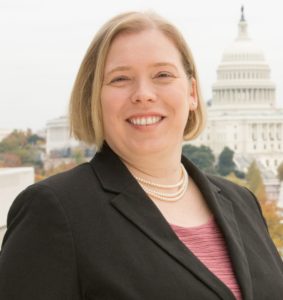
Jennifer Hawks
“Religious instruction for Texas students is best left to houses of worship, religious institutions and families. Allowing Texas schools to hire anyone under the label of ‘chaplain’ to perform the work of school counselors threatens religious liberty by substituting an undefined religious title for licensed counselor. The goal of public schools is not religious indoctrination,” said Jennifer Hawks, associate general counsel at BJC and graduate of George W. Truett Theological Seminary at Baylor University in Texas.
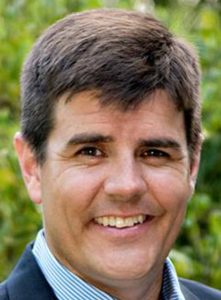
Cole Hefner
The House bill’s sponsor is Rep. Cole Hefner of Mount Pleasant, Texas. Hefner, the father of seven children, is a member of South Jefferson Baptist Church in Lindale. The Senate bill’s sponsor is Sen. Mayes Middleton of Galveston, a proponent of taxpayer-funded vouchers for private Christian schools. Both legislators are conservative Republicans.
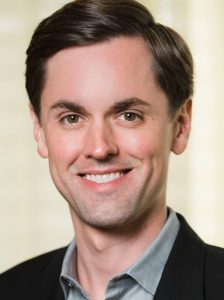
Mayes Middleton
The exact language of the bill states: “A school district may employ a chaplain instead of a school counselor to perform the duties required of a school counselor under this title. A chaplain employed under this subsection is not required to be certified by the State Board for Educator Certification.”
Currently, Texas law requires school counselors to pass a school counselor certification exam, to hold at least a 48-hour master’s degree in counseling from an accredited institution of higher education, and to have two creditable years of teaching experience as a classroom teacher.
“Misusing the title of ‘chaplain’ to shortcut standards for public school counselors undermines religious freedom in public schools.”
Hefner’s bill would allow “chaplains” to replace these trained and licensed school counselors.
“Professional chaplains help individuals explore their own religious beliefs, especially in contexts such as military service, hospitals and prisons where one’s individual ability to engage in religious exercise may be limited,” Hawks explained. “School counselors perform critical work helping students achieve academically, manage their emotions, learn interpersonal skills and plan for post-graduation options. We should not blur the differences in these important professions. Misusing the title of ‘chaplain’ to shortcut standards for public school counselors undermines religious freedom in public schools.”
“If more counselors are needed, then the Texas Legislature should give public schools the resources to hire more counselors,” she concluded.
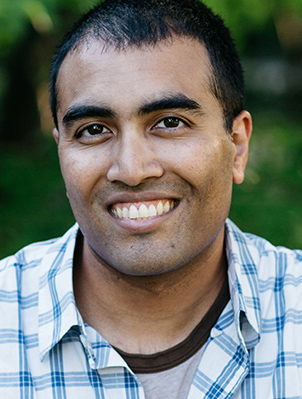
Hemant Mehta
Hemant Mehta, editor of The Friendly Atheist website, also warns of church-state separation problems with the bill.
“Even though Texas has a budget surplus of roughly $32.7 billion, these lawmakers aren’t even thinking about giving schools the resources they need to hire more mental health professionals. Instead, they want those positions staffed by chaplains who would undoubtedly be Christian and who don’t need any paperwork to attest to their abilities to do the job,” Mehta wrote.
“We’ve seen plenty of symbolic examples of Christian nationalism, like putting ‘In God We Trust’ in public schools, but this legislation would actively harm children by not giving them access to qualified professionals in a place where, and at a time when, they arguably need them more than ever.”
The bill appears to be driven by the National School Chaplain Association, which has announced a U.S. campaign “to provide school chaplains” and cites Texas as “a national leader in school safety because of the courageous actions of its legislators to protect public school teachers and students.”
The association says it was established “to promote school chaplains as a legitimate and necessary member of a school staff through national standards for school chaplains.”
Its news release about the national campaign praised the two Texas bills as ways “to lower school violence” and urged other states to follow this example. School chaplains, the release says, can help reduce “the prevalence of school violence, which includes shootings, fighting, bullying and physical assault” by giving students “a solid spiritual foundation and a safe space to express their pain and frustrations.”
According to the association, “school violence often starts with students experiencing intense psychological or emotional pain. Then, without support at home, kids let these frustrations out through destructive behavior like disobedience, physical violence, disrespect for authority and vices.”
“Spiritual care has long been absent from the school system.”
Chaplains are needed, the group says, because “spiritual care has long been absent from the school system. As a result, students are often left alone to navigate complex emotions without support from trusted adults or authority figures.”
The association’s founder is Rocky Malloy, a self-styled missionary who has published 13 books for students from kindergarten to 12th grade to teach what he considers biblical principles.
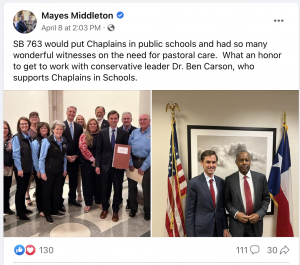 “Everything about the books is covert, because we’re delivering Jesus in a package that can fit into the public school system,” he said in an interview with Risen magazine. “Each book talks about what in Latin America are called ‘universal truths’: health, gender, environment, government and economy. It’s a 35-week course, which is a complete school year. Everything has purpose and they learn why they’re studying math and why ethics, government and morals are important. It’s all based on seven principles found in Genesis, the first two chapters, before sin.”
“Everything about the books is covert, because we’re delivering Jesus in a package that can fit into the public school system,” he said in an interview with Risen magazine. “Each book talks about what in Latin America are called ‘universal truths’: health, gender, environment, government and economy. It’s a 35-week course, which is a complete school year. Everything has purpose and they learn why they’re studying math and why ethics, government and morals are important. It’s all based on seven principles found in Genesis, the first two chapters, before sin.”
This is yet another attempt to implant Christian teaching into public schools, Mehta warned.
“Instead of making sure schools have enough funding to hire experts in mental health, the NSCA wants to replace them with untrained chaplains who only have Jesus at their disposal. We’ve already seen that happening in the military and there’s been pushback for years from people who want solutions that don’t involve one specific faith.
“Bringing chaplains to schools won’t solve any problems; it’ll only create new ones,” Mehta continued. “Why would a Muslim or atheist student be better off meeting with a Christian chaplain and not a trained social worker? Is there any reason to think non-Christian chaplains would be hired by any of these districts? What would the chaplain bring to the table that those other (actual) experts can’t? Absolutely nothing. If a child wants to see a pastor, their families should be able to arrange it on their own time.”
Related articles:
Christian nationalists target public schools, undermining freedom of religion, webinar guests show


